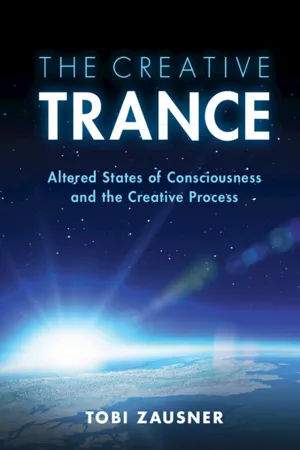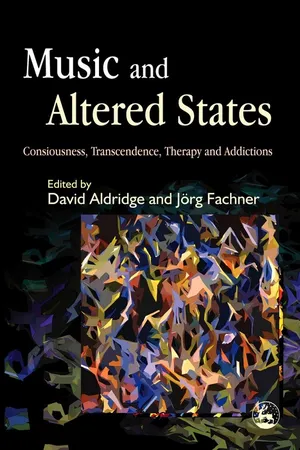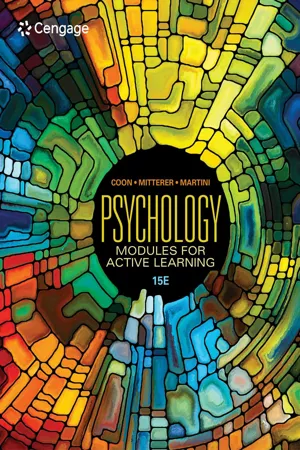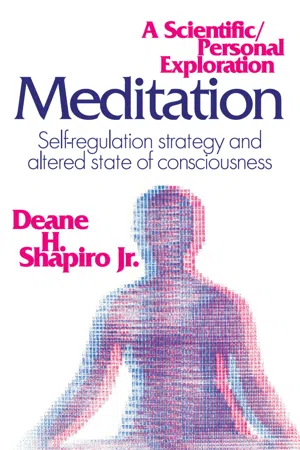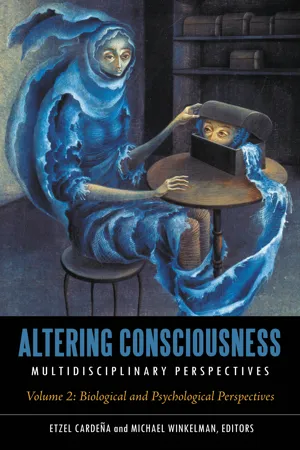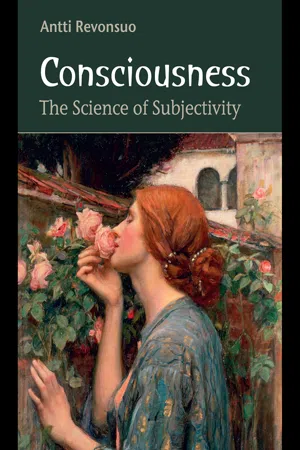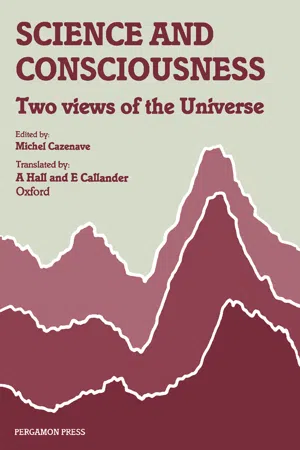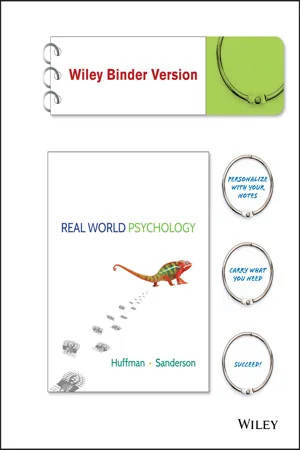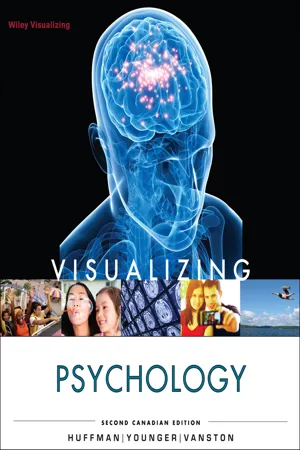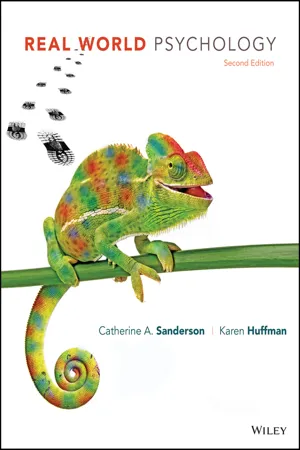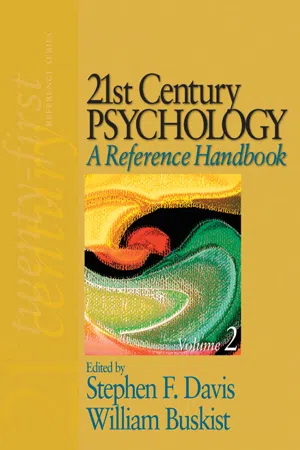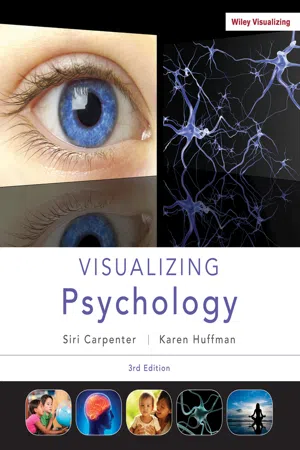Psychology
Altered States of Consciousness
Altered states of consciousness refer to any mental state that differs from a person's normal waking state. This can include experiences such as meditation, hypnosis, or drug-induced states. These altered states can lead to changes in perception, cognition, and self-awareness, and are of interest to psychologists studying human consciousness and behavior.
Written by Perlego with AI-assistance
Related key terms
1 of 5
12 Key excerpts on "Altered States of Consciousness"
- eBook - PDF
The Creative Trance
Altered States of Consciousness and the Creative Process
- Tobi Zausner(Author)
- 2022(Publication Date)
- Cambridge University Press(Publisher)
Without it, knowledge is only information.” Altered States of Consciousness APA (2020) defines trance as an altered state of consciousness. If con- sciousness is our ongoing state of awareness, then an altered state of consciousness is an experience of psychological functioning significantly different from ordinary waking states (James, 1929; Tart, 1990; APA, 2020). Varying according to the individual, these states are often associated with transformed orientations about time and place, and can have different levels of self-awareness, reality testing, and response to stimuli. Some of these states may contain sensations of boundlessness, ecstasy, or union with the universe, becoming memorable experiences. Altered States of Consciousness include the creative process, meditations, hypnosis, reveries, prayer, dreams, and the hypnogogic or hypnopompic states between wakefulness and sleep. They may also arise from mystical experiences, religious ceremonies, or changed neurobiological functioning due to psychoactive drugs, sensory deprivation, or oxygen depletion. Although classical psychoanalysis regards altered states as psychologically regressive, humanistic psychology, Jungian psychology, and transpersonal Altered States of Consciousness 25 psychology view them as elevated states of consciousness that may indicate a more advanced stage of personal and spiritual development (APA, 2020). The Altered State of Relinquishing Control in the Creative Trance In some instances of the creative trance there is an altered state of con- sciousness, which manifests as a willing loss of conscious control over the work produced. This dissociative experience, which will be discussed further in Chapters 3 and 4, can occur when individuals both acknowledge and voluntarily accept a loss of conscious decision-making during their creative process. At this point, the ego appears to willingly relinquish control to what is perceived to be the autonomy of the work. - eBook - ePub
Music and Altered States
Consciousness, Transcendence, Therapy and Addictions
- Joerg Fachner, David Aldridge(Authors)
- 2005(Publication Date)
- Jessica Kingsley Publishers(Publisher)
Chapter 2 Music and Altered States of Consciousness: An OverviewJörg FachnerAltered States of ConsciousnessOur normal waking consciousness, rational consciousness as we call it, is but one special type of consciousness, whilst all about it, parted from the filmiest of screens, there lies potential forms of consciousness entirely different. (James 1902, p.228)The term ‘Altered States of Consciousness’ implies that there is a consciousness that is unchanged, or ‘normal’. Tart, as well Dittrich (1996) or James (1902) discuss consciousness as a complex psycho-physiological system of states whereby our so-called ‘normal’ consciousness is only a specific construction in the sense of a ‘specialized tool’ for everyday purposes (see Tart 1975, p.3). With this tool, we find orientation in our social and physical environment but consciousness may be intentionally changed and altered by various influencing factors. According to the ‘Thomas Theorem’, there are no Altered States of Consciousness: ‘If men define situations as real, they are real in their consequences’ (Thomas 1927). There is a continuous flow of changing situations and situative definitions of persons in various contexts where intensities of conscious states take changing forms dependent on the individual’s attention, intention and situation, as well as his cultural background.Nevertheless, everybody experiences Altered States of Consciousness; that is, in a waking but altered state, we are aware of changes that may be observed by others as well (Roth 1994). Tassi, from a neuropsychological stance, differentiates between, on one hand, ‘physiological states of consciousness’ depending on spontaneously changing levels of vigilance, arousal and biological rhythms, and on the other, intended and therefore ‘evoked states of consciousness’ induced by psychotropic drugs, meditation, sensory deprivation, etc. (Tassi and Muzet 2001, p.185). This notion of a personal intention to evoke Altered States of Consciousness positively stresses the voluntary character of an induced change, but disregards states that are changed because of pathology or traumatic events. Dittrich further differentiates between sleeping and waking consciousness and coins the term ‘altered states of waking consciousness’ to distinguish ‘states of consciousness in sleep as e.g. REM dreams or related psychic activities’ (Dittrich 1996, p.1). To distinguish a normal waking state from an altered state of consciousness Glicksohn (1993) discusses personal modes of meaning during altered state cognition and stresses that Altered States of Consciousness are primary cognitive events. He denies a definition that reduces Altered States of Consciousness to vigilance changes only. An altered state of consciousness is ‘any mental state…recognized…as representing a sufficient deviation in subjective experience…from certain general norms… during alert, waking consciousness’ (Ludwig in Glicksohn 1993, p.2). - eBook - PDF
Psychology
Modules for Active Learning
- Dennis Coon, John Mitterer, Tanya Martini, , Dennis Coon, John Mitterer, Tanya Martini, (Authors)
- 2021(Publication Date)
- Cengage Learning EMEA(Publisher)
One dramatic example is the regular consumption of a mind-altering potion called aya-huasca. Considered a psychedelic sacrament by members of Uniao do Vegetal (UDV), a Brazilian religion, twice-monthly consumption of ayahuasca is believed to foster a deeper connection with nature, improving physical, emotional, and spiritual well-being. Like Buddhists engaging in meditation practices, Turk-ish whirling dervishes entranced by their twirling dance, or New Zealand Maori priests performing nightlong rituals to communicate with the mythical period that the Aborigi-nes call “Dreamtime,” the ritual use of ayahuasca is meant to cleanse the mind and body. When they are especially intense, such experiences can bring altered awareness and personal revelation (de Rios & Grob, 2005). People seek some altered states purely for pleasure or escape, as is often true of drug intoxication. Yet as the UDV illustrates, many cultures regard altered consciousness as a pathway to personal enlightenment. Indeed, all cultures and most religions recognize and accept some alterations of consciousness. However, the meaning given to these states varies greatly—from signs of “madness” and “pos-session” by spirits to life-enhancing breakthroughs. Thus, cultural conditioning greatly affects what altered states we recognize, seek, consider normal, and attain (Cardeña et al., 2011). Let’s continue with a more detailed look at two interest-ing altered states, hypnosis and meditation, before turning our attention to sleep, dreams, and drug use and abuse in the sections that follow. In many cultures, rituals of healing, prayer, meditation, purification, or personal transformation at sites like this Taoist temple in Hong Kong are accompanied by Altered States of Consciousness. John Mitterer Hypnosis—Look into My Eyes Learning Outcome 23.2 Explain how hypnosis works and describe its effects, while distinguishing between state and nonstate theories of hypnosis “Your body is becoming heavy. - eBook - ePub
Meditation
Self-regulation Strategy and Altered State of Consciousness
- Rosemary A. Stevens, Jr. Shapiro(Authors)
- 2017(Publication Date)
- Routledge(Publisher)
AS A BASIS for our discussion, we will use the general definition of altered states proposed by Tart (1975). He suggested thatOur ordinary discrete state of consciousness is a construction built up in accordance with biological and cultural imperatives for the purpose of dealing with our physical, intrapersonal, and interpersonal environments. A discrete altered state of consciousness is a radically different way of handling information from the physical, intrapersonal, and interpersonal environments, yet the discrete altered state of consciousness may be as arbitrary as our ordinary discrete state of consciousness (p. 24).Note that this definition is value free. It allows us to study a discrete altered state of consciousness without a priori judgment.At this point, further clarification should be made about my use of the phrase “altered state of consciousness.” There are some problems with this phrase which merit comment. First, the problem of defining meditation by its effects needs to be considered. As noted in a previous work (Shapiro & Giber, 1978), we need to distinguish whether meditation as an altered state is conceptualized as an independent variable (causing certain subsequent behavioral changes in a person) or a dependent variable: (i.e. what are the altered-state effects of meditation.) The phrase “meditation as an altered state” does not make that distinction.Second, the phrase seems to imply a uniform “altered state” unique to meditation. Although there may be certain experiences common to meditation practice (Osis et al., 1973; Kohr, 1977), there are certainly many different types of altered-state experiences which may occur as a result of a specific meditation technique, as well as across different techniques. Further, there are many different methods to attain ASC experiences similar to those which occur in meditation. I have tried to be as precise as possible in discussing these issues throughout the text. As noted earlier (Chapter One, 1.7) the phrase “meditation as an altered state of consciousness” is intended primarily to help researchers differentiate what aspect of meditation they are studying—i.e. its self-regulation qualities, or altered-state qualities. - eBook - PDF
Altering Consciousness
Multidisciplinary Perspectives [2 volumes]
- Etzel Cardeña, Michael J. Winkelman, Etzel Cardeña, Michael J. Winkelman(Authors)
- 2011(Publication Date)
- Praeger(Publisher)
However, a truly in-depth discussion of any of these individual experiences or factors is beyond the scope of this chapter, though every effort was made to reference additional materials that an interested reader may wish to review. In addition, it should be noted that many of these topics were studied over several decades (and continue to be investigated today) and the decision to include a phenome- non in a certain decade was based on the timing of the initial work, a key discovery, or the majority of research happening at that time. Through this discussion, our retrospective look at research on altering consciousness may suggest new directions of inquiry including further empirical, phe- nomenological, neurological, and psychological studies of ASC in the upcoming 50 years. The 1960s: Formative Years The Language of Altered States In contrast to the earlier paradigmatic framework of pathology, psy- chiatrist Arnold Ludwig (1966) positively characterized the term Altered States of Consciousness as 114 Altering Consciousness any mental state(s), induced by various physiological, psychological, or pharmacological maneuvers or agents, which can be recognized subjec- tively by the individual himself (or by an objective observer of the individ- ual) as representing a sufficient deviation in subjective experience or psychological functioning from certain general norms for that individual during alert, waking consciousness. (p. 225) Ludwig also delineated an assortment of general characteristics associ- ated with ASC: alterations in discursive thinking, emotional expression, significance or meaning, subjective time, body image perception, a sense of ineffability, reduced volitional control, hypersuggestibility, and reju- venation. Nevertheless, one limitation of Ludwig’s definition is that it neglected to operationalize a “sufficient deviation in subjective experience” (1966, p. 225). - eBook - ePub
Consciousness
The Science of Subjectivity
- Antti Revonsuo(Author)
- 2009(Publication Date)
- Psychology Press(Publisher)
Part two Central domains of consciousness sciencePassage contains an image
IV.Altered States of Consciousness
Passage contains an image
Chapter 12 What is an “altered state of consciousness” (ASC)?
Introduction 23012.1 How to define “altered state of consciousness” 230Chapter summary 232Further reading 233Brief discussion questions 233Introduction
The stream of our subjective experiences flows steadily on, following the course of its river-bed, with the sensations, perceptions, emotions and thoughts merging with each other as they gradually flow by in ever-changing patterns and tapestries. Although the patterns of subjective experience are enormously variable, they still seem to remain within certain bounds, at least most of the time. Sometimes the stream of experience seems to take altogether unusual forms, creating patterns not normally enabled. The stream of consciousness sometimes runs through rapids, ravines or waterfalls, sometimes it enters perfectly still and calm waters, sometimes the waters are muddy and at other times crystal clear. The unusual varieties of experience are called “Altered States of Consciousness”.12.1 How to define “altered state of consciousness”
The notion of “altered state of consciousness” (ASC) presupposes that there is some defineable normal or baseline state of consciousness (NSC) that is temporarily transformed into an altered state but will return back to the baseline state sooner or later. To a first approximation, an ASC is a temporary, reversible state of consciousness that significantly differs from the baseline state and typically lasts from a few minutes to at most a few hours - eBook - PDF
Science & Consciousness
Two Views of the Universe
- M. Cazenave(Author)
- 2013(Publication Date)
- Pergamon(Publisher)
PART II Neuropsychophyswlogy and States of Consciousness This page intentionally left blank Altered States of Consciousness YUJIRO IKEMI Altered States of Consciousness (ASC) is a popular term that is difficult to define satisfactorily, but what it refers to is generally well known. Hypnosis, meditation, autogenic training, Zen, yoga, certain drug-induced states and various mental conditions sometimes associated with sensory deprivation, reverie, fasting, prayer and similar practices are usually included in this category. The first point to be made is that very little is known at all about ASC. For centuries people of different cultures all over the world have practised different forms of ASC to gain more understanding of themselves, the mind and what lies beyond, but still today little is known about what ASC are, how they operate, how they can be used most efficiently or even how to define them. So far, neither philosophy, psychology, physiology, nor any other discipline has contributed much to the understanding of ASC. One reason is that man can only begin to understand changes in consciousness by experiencing them, yet most people who study ASC clinically or experi-mentally do not experience what they study. Secondly, at present it is not possible to verbalize most of the subtle experi-ences that occur during an ASC, as most languages do not have adequate expres-sions to describe them. A third reason for not knowing much about ASC is that only relatively crude techniques are available for measuring any physical parameter that might indicate changes in consciousness. Despite this, in recent years much effort has been made to study physiological concomitants of ASC and there is now some data which makes possible speculation about the major structures involved in consciousness even though practically nothing is known about precise central mechanisms. - eBook - PDF
- Karen R. Huffman, Catherine A. Sanderson(Authors)
- 2013(Publication Date)
- Wiley(Publisher)
Next, we’ll discuss two alternate states—sleep and dreaming— followed by psychoactive drugs. Finally, we explore additional routes to altered consciousness through meditation and hypnosis. ■■ CONSCIOUSNESS, SLEEP, AND DREAMING RETRIEVAL PRACTICE While reading the upcoming sections, respond to each Learning Objective in your own words. Then compare your responses with those found at www.wiley.com/college/huffman. 1 DEFINE consciousness and alternate states of consciousness (ASCs). 2 EXPLAIN how circadian rhythms affect our lives. 3 REVIEW the stages of sleep. 4 COMPARE and contrast the theories about why we sleep and dream. 5 SUMMARIZE the types of sleep disorders. William James, the first U.S. psychologist, likened consciousness to a stream that’s constantly changing yet always the same. It meanders and flows, sometimes where the person wills and sometimes not. However, the process of selective attention (Chapter 4) allows us to control this stream of consciousness through deliberate concentration and full attention. For example, at the present moment you are, we hope, fully awake and concentrating on the words on this page. At times, however, your control may weaken, and your attention may drift to thoughts of a laptop you want to buy, a job, or an attractive classmate. In addition to meandering and flowing, your stream of consciousness also varies in range and depth. It is not an all-or-nothing phenomenon—you are not either conscious or unconscious. Instead, consciousness exists along a continuum. Other than wakefulness, there are common altered states, such as sleep and dreaming, psychoactive drug states, meditation, and hypnosis. You may think of yourself as being unconscious while you sleep, or fully conscious while “high” on certain drugs, but that’s not true. Rather, you are in an alternate state of con- sciousness (ASC) . In this chapter, you will learn about both everyday, wakeful consciousness and ASCs. - eBook - PDF
- Karen R. Huffman, Alastair Younger, Claire Vanston(Authors)
- 2013(Publication Date)
- Wiley(Publisher)
For their victims, these creatures are vividly real; for scientists they represent a neural malfunc- tion known as sleep paralysis that can occur as we cross the divide between waking and sleep. In this chapter, we discuss the mysterious concept of consciousness and its various alter- nate states. We begin with a general overview of consciousness and then explore the way it changes when we sleep and dream. We discuss how we alter it with drugs and other chemicals, and why these experiences are often desirable and pleasurable. Finally, we explore two alter- native routes to altered consciousness: medita- tion and hypnosis. 127 CHAPTER OUTLINE Consciousness, Sleep, and Dreaming 128 ■ Applying Psychology: A Wake-Up Call: Are You Sleep Deprived? • Stages of Sleep: How Scientists Study Sleep ■ Applying Psychology: Common Myths about Sleep and Dreams • Sleep Disorders Psychoactive Drugs: Chemically Altered States 140 ■ Applying Psychology: Deja Brew: Energy Drinks Do Caffeine Differently • Psychoactive Drugs: Four Categories Altering Consciousness through Meditation and Hypnosis 147 • Meditation: Quiet the Mind • Hypnosis: Myths and Practical Uses ■ What a Psychologist Sees: Meditation and the Brain CHAPTER PLANNER ✓ ✓ ❑ Study the picture and read the opening story. ❑ Scan the Learning Objectives in each section: p. 128 ❑ p. 140 ❑ p. 147 ❑ ❑ Read the text and study all visuals. Answer any questions. Analyze key features ❑ Visualizing, p. 129 ❑ p. 133 ❑ ❑ Applying Psychology, p. 131 ❑ p. 135 ❑ p. 140 ❑ ❑ Process Diagram, p. 141 ❑ What a Psychologist Sees, p. 148 ❑ Stop: Answer the Concept Checks before you go on: p. 139 ❑ p. 146 ❑ p. 150 ❑ End of chapter ❑ Review the Summary and Key Terms. ❑ Answer the Critical and Creative Thinking Questions. ❑ Complete the Self-Test and check your answers. - eBook - PDF
- Catherine A. Sanderson, Karen R. Huffman(Authors)
- 2016(Publication Date)
- Wiley(Publisher)
140 CHAPTER 5 States of Consciousness As we have seen, factors such as sleep, dreaming, and psychoactive drug use can create alter- nate states of consciousness (ASCs). Changes in consciousness also can be achieved by means of meditation and hypnosis. Meditation “Suddenly, with a roar like that of a waterfall, I felt a stream of liquid light entering my brain through the spinal cord . . . I experienced a rocking sensation and then felt myself slipping out of my body, entirely enveloped in a halo of light. I felt the point of consciousness that was myself growing wider, surrounded by waves of light” (Krishna, 1999, pp. 4–5). This is how spiritual leader Gopi Krishna described his experience with meditation, a group of techniques generally designed to focus attention, block out distractions, and produce an ASC (Figure 5.11). Most people in the beginning stages of meditation report a simpler, mellow type of relaxation, followed by a mild euphoria and a sense of timelessness. Some advanced meditators report experiences of profound rapture, joy, and/or strong hallucinations. How can we explain these effects? Brain imaging studies suggest that meditation’s require- ment to focus attention, block out distractions, and concentrate on a single object, emotion, or word, reduces the number of brain cells that must be devoted to the multiple, competing tasks normally going on within the brain’s frontal lobes. This narrowed focus thus explains the feelings of timelessness and mild euphoria. Research has also verified that meditation can produce dramatic changes in basic physiological processes, including heart rate, oxygen consumption, sweat gland responses, and brain activity. In addition, it’s been somewhat successful in reducing pain, anxiety, and stress; lowering blood pressure; and improving overall cognitive functioning and mental health (see photo) (Crescentini et al., 2016; Heffner et al., 2016; Taylor & Abba, 2015). - Stephen F. Davis, William Buskist, Stephen F. Davis, William F. Buskist(Authors)
- 2007(Publication Date)
- SAGE Publications, Inc(Publisher)
187 21 S TATES OF C ONSCIOUSNESS J OSEPH J. P ALLADINO AND C HRISTOPHER M. B LOOM University of Southern Indiana T he term consciousness has a long history in psy-chology. One way to assess the concept is to con-sider how it has been addressed in our discipline’s gateway—introductory psychology texts. The first edition of the classic R. C. Atkinson and R. L. Atkinson text-book appeared in 1957. The tenth edition of this text was published in 1990. The topic of consciousness occupies a chapter in a section of the text titled Consciousness and Perception ; the specific chapter that deals with the topic is titled Consciousness and Its Altered States . The breadth of topics in this chapter is similar to what we find in more recently published textbooks (e.g., Davis & Palladino, 2007; D. H. Hockenbury & S. E. Hockenbury, 2006) and includes subtopics such as aspects of consciousness (con-scious, unconscious, subconscious), divided conscious-ness, dissociation and multiple personality, sleep and dreams, psychoactive drugs, meditation, and hypnosis. The authors begin their chapter with these words: As you read these words, are you awake or dreaming? Hardly anyone is confused by this question. We all know the dif-ference between an ordinary state of wakefulness and the experience of dreaming. We also recognize other states of consciousness , including those induced by drugs such as alco-hol and marijuana. (R. L. Atkinson, R. C. Atkinson, Smith, & Benn, 1990, p. 195) Despite the apparent clarity of the opening of the Atkinson et al. (1990) chapter on consciousness, the topic is perhaps one of the more difficult ones for the discipline, as its history reveals. Wilhelm Wundt’s (1832–1920) founding of the first psychological laboratory in 1879 heralded his attempt to identify and categorize elements of conscious experience using the method known as introspection, or examination of one’s own mental state.- eBook - PDF
- Siri Carpenter, Karen Huffman(Authors)
- 2012(Publication Date)
- Wiley(Publisher)
For exam-ple, at the present moment you are, hopefully, fully awake and concentrating on the words on this page. At times, however, your control may weaken, and your stream of consciousness may W drift to thoughts of a computer you want to buy, a job, or an attractive classmate. In addition to meandering and flowing, your “stream of consciousness” also varies in depth. Consciousness is not an all-or-nothing phenom-enon—conscious or unconscious. Instead, it ex-ists along a continuum ( Figure 5.1 ). Other than being awake, two of the more common states of consciousness are sleep and dreaming. You may think of yourself as being unconscious while you sleep, but that’s not true. Rather, you are in an alternate state of consciousness (ASC) . In this chapter, you will Consciousness, Sleep, and Dreaming LEARNING OBJECTIVES 4. Compare and contrast the theories of why we sleep and dream. 5. Summarize the types of sleep disorders. 1. Compare the different forms and levels of consciousness. 2. Explain the elements of the circadian “clock.” 3. Review the stages of sleep. RETRIEVAL PRACTICE While reading the upcoming sections, respond to each Learning Objective in your own words. Then compare your responses with those in Appendix B. Levels of awareness • Figure 5.1 Consciousness exists on a continuum from low awareness to high awareness. 120 CHAPTER 5 States of Consciousness Consciousness, Sleep, and Dreaming 121 Disruptions in circadian rhythms cause increased fa-tigue, decreased concentration, sleep disorders, and other health problems (Daan, 2011; Karatsoreos et al., 2011; Kyriacou & Hastings, 2010; Salvatore et al., 2008). Many physicians, nurses, police, and others have rotating work schedules (about 20% of employees in the United States) and do manage to function well.
Index pages curate the most relevant extracts from our library of academic textbooks. They’ve been created using an in-house natural language model (NLM), each adding context and meaning to key research topics.
